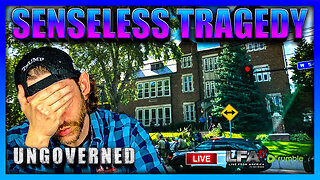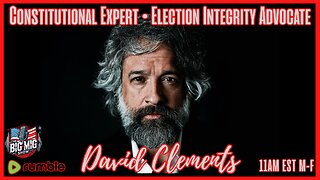Premium Only Content

The Paradox of Wealth and Happiness - The Social Atmosphere Movement
the social atmosphere movement facebook
https://www.facebook.com/profile.php?id=100088975077289
The Paradox of Wealth and Happiness: An Exploration of Inequality, Social Relations, and the Market Economy
By CHATGPT
Introduction
In contemporary society, the pursuit of wealth and success has become synonymous with happiness and social status. This idea is perpetuated by cultural norms and media portrayals that suggest financial success equates to personal fulfillment and desirability. However, this narrative neglects a critical examination of the true nature of wealth, the implications of materialism, and the societal structures that reinforce inequality. This essay explores the paradox of wealth and happiness, emphasizing the distinction between material wealth and true wealth, which is rooted in social relations and personal well-being. By deconstructing the myth that money brings happiness, this essay will argue that the market economy, driven by scarcity and competition, fosters inequality and ultimately impoverishes society in more ways than it enriches.
The Pursuit of Wealth and the Illusion of Happiness
The modern societal narrative often glorifies wealth and success, painting a picture where financial prosperity is the ultimate goal. This narrative is particularly evident in the realm of romantic relationships, where financial stability and material success are frequently equated with desirability. For instance, the stereotype that women are attracted to wealthy men—such as CEOs, billionaires, or successful business owners—reinforces the idea that wealth is an essential component of happiness and social status. However, this portrayal is not only reductive but also overlooks the complex factors that contribute to genuine human fulfillment.
Wealth, in its material form, offers the allure of comfort, luxury, and security. Yet, these external symbols of success often fail to provide lasting satisfaction. The notion that financial success equates to happiness is a fallacy that neglects the deeper aspects of human experience. Psychological research has repeatedly shown that after a certain point, increases in income have a diminishing impact on an individual's overall happiness. This phenomenon, known as the "Easterlin Paradox," illustrates that while money can alleviate financial stress and provide basic needs, it does not directly correlate with long-term happiness or life satisfaction.
Moreover, the pursuit of wealth often leads individuals to prioritize material possessions and financial success over meaningful social connections. This shift in priorities can result in social isolation, increased stress, and a sense of emptiness—ironically, the very feelings that wealth was supposed to alleviate. In essence, while wealth can provide temporary pleasure, it does not fulfill the deeper psychological needs that are essential for genuine happiness.
The Role of Social Relations in True Wealth
True wealth, as opposed to material wealth, is deeply rooted in social relations and the quality of human connections. Social relationships are a fundamental aspect of human existence, providing emotional support, a sense of belonging, and opportunities for personal growth. These relationships, whether with family, friends, or community members, are essential for psychological well-being and are a significant predictor of life satisfaction.
Numerous studies have demonstrated that strong social connections are associated with better mental health, increased longevity, and greater overall happiness. For instance, research from Harvard University's Study of Adult Development, which has followed participants for over 80 years, consistently finds that good relationships—not wealth or fame—are the most significant predictors of a happy and healthy life. This finding underscores the importance of social ties in fostering well-being and highlights the limitations of material wealth in achieving true happiness.
In contrast, individuals who prioritize wealth and material success often experience weaker social connections and greater loneliness. The pursuit of wealth can lead to a competitive, individualistic mindset, where personal success is valued above communal well-being. This mindset not only undermines the quality of social relationships but also perpetuates a sense of dissatisfaction, as individuals constantly compare themselves to others in terms of financial status.
The Market Economy and the Myth of Abundance
The market economy, which underpins much of modern society, is often seen as a mechanism for creating wealth and enabling abundance. However, this view is overly simplistic and fails to account for the inherent inequalities and social costs associated with market-driven systems. The market is not a neutral force; it is a social construct that reflects and reinforces existing power dynamics and inequalities.
One of the central tenets of the market economy is the idea that competition drives innovation and efficiency, leading to greater wealth and prosperity for all. However, this idealized version of the market overlooks the reality that competition often leads to winners and losers, creating significant disparities in wealth and opportunities. The market's focus on profit maximization and efficiency can result in the exploitation of labor, environmental degradation, and the concentration of wealth in the hands of a few, rather than the equitable distribution of resources.
Furthermore, the market operates on the principle of scarcity, where goods and services are valued based on their limited availability. This scarcity-driven model not only fuels competition but also perpetuates a mindset of lack and inadequacy. Individuals are encouraged to accumulate wealth and possessions as a means of securing their place in society, reinforcing the idea that more is always better. However, this constant striving for more often leads to a sense of dissatisfaction, as the pursuit of material wealth is ultimately insatiable.
The market economy's emphasis on material wealth also undermines the value of non-material forms of wealth, such as social connections, community, and well-being. These intangible forms of wealth are often devalued or ignored in market-driven societies, where success is primarily measured in economic terms. As a result, individuals and communities may neglect the social and relational aspects of life that are crucial for true happiness and fulfillment.
The Paradox of Poverty in Wealth
The paradoxical nature of wealth is that, while it is often seen as the solution to poverty, it can also be a form of poverty in itself. This is particularly evident in the way that wealth, when pursued as an end in itself, can lead to social and spiritual impoverishment. The market's focus on material success and financial gain can create a sense of alienation and disconnection, as individuals prioritize wealth accumulation over meaningful social connections and personal well-being.
This form of poverty is not just an individual experience but also a societal one. A society that values wealth above all else is likely to experience social fragmentation, inequality, and a loss of communal bonds. The market's emphasis on competition and individual success can erode social trust and cooperation, leading to a more divided and unequal society. In this sense, the pursuit of wealth can create a form of collective poverty, where the richness of human relationships and communal life is diminished.
Moreover, the market's focus on scarcity and competition can create a sense of fear and insecurity, as individuals are constantly reminded of what they lack rather than what they have. This scarcity mindset can lead to a cycle of endless striving and dissatisfaction, where individuals are never content with their current circumstances and always seek more. In this way, the pursuit of wealth can create a sense of perpetual poverty, where individuals are never truly satisfied, regardless of how much they accumulate.
Inequality and the Market's Structural Flaws
The market economy's emphasis on competition and individual success inevitably leads to inequality. While some individuals and corporations thrive in this environment, others are left behind, creating significant disparities in wealth, power, and opportunities. This inequality is not just an unfortunate byproduct of the market but a structural feature that is inherent to its operation.
The market's focus on profit maximization often leads to the concentration of wealth in the hands of a few, while the majority of individuals experience stagnating wages, job insecurity, and limited opportunities for social mobility. This concentration of wealth and power exacerbates social inequalities, as those with more resources are able to access better education, healthcare, and other opportunities, while those with less are increasingly marginalized.
Furthermore, the market's emphasis on efficiency and productivity can lead to the exploitation of labor and the degradation of working conditions. In the pursuit of profit, companies may prioritize cost-cutting measures, such as outsourcing labor to low-wage countries or automating jobs, which can lead to job loss and economic insecurity for many workers. This focus on efficiency can also result in environmental degradation, as companies prioritize short-term profits over long-term sustainability.
The market's structural flaws are also evident in its treatment of social and environmental costs as externalities. These costs, such as pollution, resource depletion, and social inequality, are often not accounted for in the market's calculations of profit and loss. As a result, the market may appear to create wealth and prosperity, while in reality, it is contributing to the degradation of the environment and the erosion of social bonds.
Reimagining Wealth and Happiness: Toward a New Paradigm
In light of the limitations and consequences of the market economy, it is essential to reimagine wealth and happiness in a way that prioritizes social relations, well-being, and sustainability over material accumulation and financial success. This new paradigm would recognize that true wealth is not measured by the amount of money or possessions one has but by the quality of one's relationships, the strength of one's community, and the overall well-being of society.
One way to move toward this new paradigm is by fostering a more equitable and inclusive economy that prioritizes the well-being of all individuals, rather than just a select few. This could involve policies that promote social equity, such as progressive taxation, universal healthcare, and access to quality education and affordable housing. These policies would help to reduce inequality and ensure that all individuals have the opportunity to thrive, regardless of their economic background.
Another approach is to shift the focus from competition to cooperation, recognizing that true wealth is created not through individual success but through collective well-being. This could involve promoting cooperative business models, such as worker-owned cooperatives, where profits are shared among all members, rather than concentrated in the hands of a few. It could also involve fostering community-based initiatives, such as local food systems, that prioritize sustainability and social equity over profit.
Additionally, it is important to challenge the cultural norms that equate wealth with happiness and success. This could involve promoting alternative measures of well-being, such as the Gross National Happiness index, which takes into account factors such as health, education, and environmental sustainability, rather than just economic output. It could also involve encouraging individuals to prioritize social connections, community involvement, and personal growth over material accumulation.
Ultimately, reimagining wealth and happiness requires a fundamental shift in values and priorities, away from materialism and individualism and toward a more holistic and interconnected understanding of well-being. This shift would recognize that true wealth is not found in money or possessions but in the richness of human relationships, the strength of community, and the overall health and happiness of society.
Conclusion
The pursuit of wealth and success, as defined by the market economy, is a deeply ingrained aspect of modern society. However, this pursuit often leads to a paradoxical form of poverty, where individuals and societies are deprived of the true wealth that comes from social connections, community, and well-being. The market's emphasis on competition, scarcity, and material accumulation creates significant inequalities and undermines the quality of social relations, ultimately leading to a sense of dissatisfaction and alienation.
To address these challenges, it is essential to reimagine wealth and happiness in a way that prioritizes social relations, equity, and sustainability. This new paradigm would recognize that true wealth is not measured by the amount of money or possessions one has but by the quality of one's relationships, the strength of one's community, and the overall well-being of society. By shifting our values and priorities away from materialism and individualism and toward a more holistic understanding of well-being, we can create a more equitable, connected, and fulfilling society for all.
This essay has explored the complex relationship between wealth, happiness, and inequality, highlighting the limitations of the market economy and the importance of social relations in achieving true well-being. By challenging the dominant narrative that equates wealth with happiness, we can begin to envision a society where true wealth is measured not by material possessions but by the richness of human connections and the overall health and happiness of our communities.
-
 LIVE
LIVE
LFA TV
4 hours agoLFA TV ALL DAY STREAM - THURSDAY 8/28/25
4,905 watching -
 LIVE
LIVE
Total Horse Channel
14 hours ago2025 URCHA Futurity | Derby & Horse Show | Thursday
102 watching -
 LIVE
LIVE
The Big Mig™
2 hours agoThe War Powers Resolution w/ David Clements
5,185 watching -
 LIVE
LIVE
Badlands Media
7 hours agoBadlands Daily: August 28, 2025
4,235 watching -
 1:43:15
1:43:15
Dear America
3 hours agoTrans Violence Against Christianity MUST BE STOPPED!!
110K82 -
 LIVE
LIVE
Wendy Bell Radio
6 hours agoGuns Don't Kill People
6,650 watching -
 2:05:38
2:05:38
Matt Kohrs
10 hours agoMarket Open: New Highs or Bust?! || Live Trading Futures & Options
25K2 -
 46:34
46:34
Randi Hipper
1 hour agoWALL STREET'S CRYPTO BET REVEALED! HINT: IT'S NOT BITCOIN!
9.49K2 -
 1:07:27
1:07:27
The Mike Schwartz Show
2 hours agoTHE MIKE SCHWARTZ SHOW with DR. MICHAEL J SCHWARTZ 08-28-2025
13.3K3 -
 2:04:35
2:04:35
Game On!
20 hours ago $3.08 earnedCollege Football Is BACK! Week 1 Preview!
42.5K2